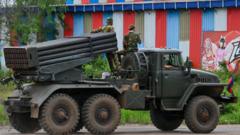As nuclear threats increase, the dynamics between Israel, Iran, and the U.S. present crucial implications for regional stability.
Israel's Potential Military Strike on Iran: Heightened Tensions in the Middle East

Israel's Potential Military Strike on Iran: Heightened Tensions in the Middle East
Amid rising tensions, analysts speculate on Israel’s readiness for possible military action against Iran’s nuclear facilities.
Israel has long believed that a military strike against Iran's nuclear enrichment facilities is necessary to prevent what it perceives as an existential threat. Prime Minister Benjamin Netanyahu has made it clear that he will do everything possible to thwart Tehran's nuclear ambitions. With tensions escalating between Israel and Iran, the potential for military conflict is a growing concern among Middle Eastern nations.
Recent reports indicate a shift in Israeli military posture, with speculation mounting about a possible strike. U.S. and European officials are wary, especially given the current administration's efforts to negotiate a nuclear deal with Iran. On the heels of these discussions, the International Atomic Energy Agency issued a rare condemnation of Iran, citing noncompliance with nuclear nonproliferation obligations. This marks the first significant reprimand in two decades.
While the scope of Israel's military plans remains unclear, the United States has pulled some of its diplomats from the region as a precaution against possible Iranian retaliation. Analysts suggest that Israel may find it challenging to incapacitate Iran’s key nuclear facilities without American assistance, raising questions about whether this is a genuine signal of impending conflict or a strategic maneuver by both nations to gain leverage in ongoing negotiations.
The urgency for Israel to act stems from significant advancements in Iran's nuclear capabilities over the last decade. Analysts agree that Iran is precariously close to generating enough nuclear material to potentially fuel multiple weapons, although the timeline for developing an operational bomb extends further. As the geopolitical landscape shifts, the choice Israel faces could significantly impact the broader stability of the Middle East.
Recent reports indicate a shift in Israeli military posture, with speculation mounting about a possible strike. U.S. and European officials are wary, especially given the current administration's efforts to negotiate a nuclear deal with Iran. On the heels of these discussions, the International Atomic Energy Agency issued a rare condemnation of Iran, citing noncompliance with nuclear nonproliferation obligations. This marks the first significant reprimand in two decades.
While the scope of Israel's military plans remains unclear, the United States has pulled some of its diplomats from the region as a precaution against possible Iranian retaliation. Analysts suggest that Israel may find it challenging to incapacitate Iran’s key nuclear facilities without American assistance, raising questions about whether this is a genuine signal of impending conflict or a strategic maneuver by both nations to gain leverage in ongoing negotiations.
The urgency for Israel to act stems from significant advancements in Iran's nuclear capabilities over the last decade. Analysts agree that Iran is precariously close to generating enough nuclear material to potentially fuel multiple weapons, although the timeline for developing an operational bomb extends further. As the geopolitical landscape shifts, the choice Israel faces could significantly impact the broader stability of the Middle East.



















